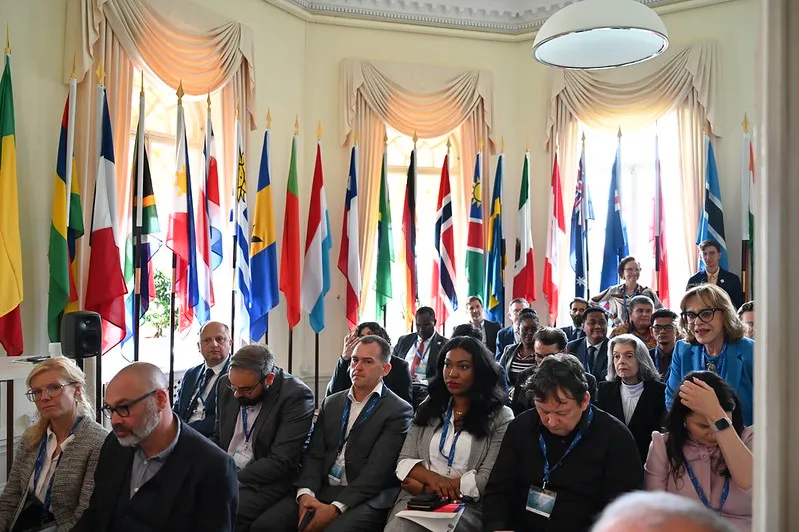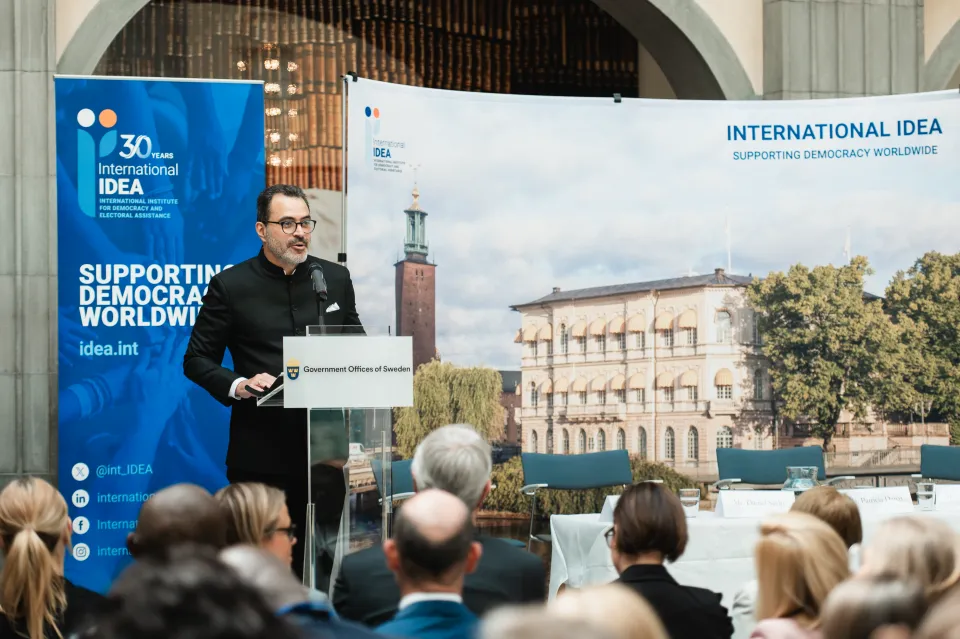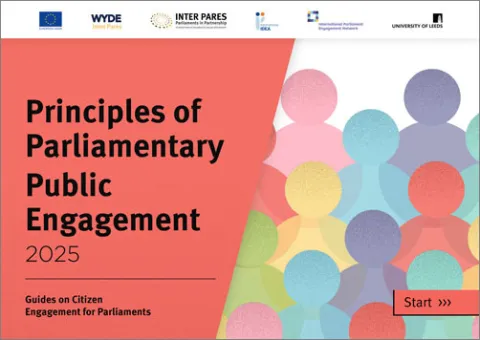Search
Region
Country
Type
SDG 5 on Gender Equality and SDG 16 on Peace, Justice and Institutions are closely interlinked and mutually reinforcing, both serving as critical enablers of the 2030 Agenda and the Sustainable Development Goals. Inclusive, transparent, and accountable institutions are key drivers of gender equality, and peaceful and just societies can only be built when women and girls are fully empowered to participate and lead in decision-making processes.
International IDEA's Secretary-General, Kevin Casas-Zamora, will speak at the World Justice Forum in Warsaw, Poland, on June 24 at 10:45 CEST.
The lecture marks the seventh event in the Stockholm Series of Public Lectures on Climate Change and Democracy.
This initiative is a cooperation between renowned Stockholm-based institutions with a particular focus on climate change and democracy from different perspectives. It aims to inform, inspire, and engage experts and the general public alike by providing high-profile public lectures on the climate-democracy nexus, followed by debate.
The lecture marks the sixth event in the Stockholm Series of Public Lectures on Climate Change and Democracy.
In 2025, we mark 30 years since the Beijing Declaration. As the global community reflects, we ask: Are the promises of gender equality being realized?
Join a powerful panel of young women leaders who were at CSW69, as they share key insights, lessons, and bold visions for the future of women’s political participation.
Featuring:
International IDEA is pleased to invite you to the online launch of our new report, “Combatting Corruption in Political Finance: Global Trends, Challenges and Solutions,” on Wednesday, 23 April 2025, from 15:30 to 17:00 CEST.
International IDEA's Democracy Assessment Unit is hosting a discussion event on Thursday, 3 April 2025, aimed at exploring how strategic foresight can help shape democratic futures.
The last two decades have seen a well-documented decline in democracy worldwide. This shift has corresponded with many governments increasing legal and policy restrictions on civil society.
Women are often marginalised from decision-making in conflict and transitional contexts. Despite evidence that women’s presence and participation lead to better and longer lasting outcomes for peace, they remain underrepresented in transitional governments and peacebuilding bodies.
International IDEA’s commitment to promote women’s empowerment and gender equality is at the core of the Institute’s mandate to advance, promote and protect sustainable democracy worldwide by responding to the key challenges and opportunities for strengthening democracy in the current and emerging democracy landscape. Such challenges include that women and men are still treated differently and given different tasks, responsibilities, opportunities, and privileges in most societies.
Thirty years after the Beijing Conference, the Beijing Declaration and Platform for Action (BPFA) remain a blueprint for equality. Amid global challenges, women leaders face increasing attacks, impacting progress towards the Sustainable Development Goals (SDGs) by 2030. Structural, socioeconomic, and cultural barriers, rooted in unequal power relations and discriminatory norms, hinder women's participation. Today just 25 countries are headed by a woman.
In 2015, the 2030 Agenda for Sustainable Development led with a bold aspiration to eradicate poverty in all of its forms by 2030 (Sustainable Development Goal (SDG) 1). There were grounds for optimism at the time, as the number of people living in extreme poverty (736 million) was lower than it had been 15 years before (UNDP n.d.).
The lecture marks the fourth event in the Stockholm Series of Public Lectures on Climate Change and Democracy.
This initiative is a cooperation between renowned Stockholm-based institutions with a particular focus on climate change and democracy from different perspectives. It aims to inform, inspire, and engage experts and the general public alike by providing high-profile public lectures on the interlinkages between climate change and democracy followed by debate.
The lecture marks the third event in the Stockholm Series of Public Lectures on Climate Change and Democracy.
On 5 November 2024, US voters will head to the polls to elect a new president. These elections will shape the future of American democracy and influence global relations.
This high-level side-event during the high-level week of the United Nations General Assembly (UNGA) aims to invigorate global efforts towards SDG16+, encouraging innovative solutions and reinforcing commitments to peace, justice, equality, inclusion and democratic principles as crucial drivers for a sustainable future for all, as reflected in the 2030 Agenda, the 2023 SDG Summit Political Declaration and the Pact for the Future.
Amid an unprecedented super-cycle election year and a global trend of dissatisfaction with elections, the sixth edition of the Global State of Democracy Report explores the factors exacerbating this deterioration and what drives people’s perceptions of electoral integrity.
El 17 de septiembre a las 5:00 PM (GMT-5), realizaremos el lanzamiento del Global State of Democracy 2024 en el auditorio del Tribunal Electoral de Panamá.


